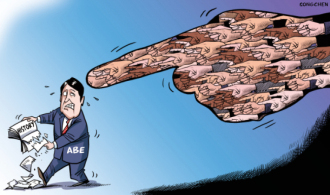The price of fish and how it was sold matter
(China Daily) Updated: 2016-02-17 07:16
 |
|
The restaurant has been shut down. Photo taken on Oct 7, 2015. [Photo/IC] |
This is something that does have to do with the price of fish.
A consumer claimed on social media a fish restaurant in Harbin, Northeast China's Heilongjiang province, ripped him off by charging him more than 10,000 yuan ($1,535) for three big fish he and his relatives consumed on the second day of Spring Festival. Worse he alleged that they were threatened by the restaurant staff when he questioned the bill.
A probe conducted by the local government department, concluded that the restaurant was not in the wrong, with the price of all its dishes clearly marked on the menu. The investigators said they could not know what happened at the time as they were unable to get in touch with the consumer.
Yet, the consumer told Chinanews.com on Tuesday what the investigation found out was not true.
Whether that is true or not, the investigators failed to say whether the restaurant had charged the customer for a greater weight of fish than he ordered, as the man claimed. Neither did it find out whether the restaurant threatened to use force when the customer cast doubt over the weight of the fish.
Behind the unreasonably high price of the fish, which is what caught the attention of the public, is the question of how the fish was sold to the customer.
This is not the first report of restaurants fleecing tourists. They appear after every national holiday. In October, 2015, a consumer was told at a restaurant in Qingdao, East China's Shandong province, that the king prawns he wanted to eat were priced 38 yuan per half a kilogram, but when the customer was handed the bill, he was charged 38 yuan for each king prawn and as a result he had to pay 1,500 yuan for the plate of prawns he consumed.
Telling customers the price of an expensive dish in a vague manner and then charging an unreasonably high price later on is a fraudulent behavior that should be punished.
Now the investigation needs to find out whether the Harbin restaurant did the same with its consumer. It is not just the interests of that particular consumer that need to be protected. It is the reputation of local tourist destinations that should be protected by cracking down on restaurants ripping off customers in a fraudulent manner.











